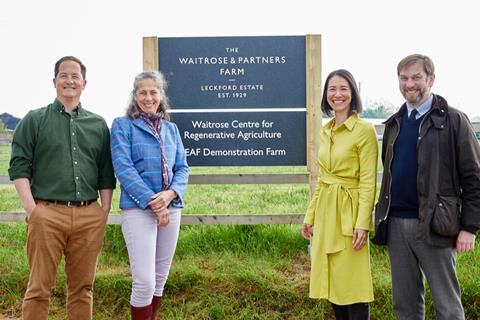Retailer announces a raft of initiatives to help fresh food suppliers reach environmental goals

Waitrose will source its British fruit and vegetables from farms that use regenerative practices by 2035, the retailer has declared.
In a major announcement under the banner of ‘Farming for Nature’, Waitrose outlined how it plans to work with its British meat, milik, eggs, fruit and vegetable suppliers to move towards nature-friendly farming practices.
The move builds on Waitrose’s commitment to reach net zero across all its UK farms by 2035, and the entire supply chain by 2050.
The retailer said its latest announcement, which commits to support more than 2,000 of its British farmers to move to nature-friendly farming practices, would help to boost financial resilience of farms in the long term and combat the effects of climate change.
Waitrose explained that regenerative agriculture is a way of farming that focuses on improving the health of the soil and the environment, making it healthier and more productive. It helps tackle issues such as top-soil erosion - the loss of the most fertile layer of soil - which is being accelerated by some farming methods and can make it harder to grow crops.
’Working in harmony with nature’
Unveiling the plans to its British farmers at the Leckford Estate in Hampshire, where Waitrose has been farming regeneratively since 2020, executive director James Bailey committed the supermarket to play its part in “revolutionising the British food system”.
In his speech to farmers, Bailey announced that Waitrose will work with them to produce food that works in harmony with nature, to source meat, milk, eggs, fruit and vegetables from UK farms which use regenerative practices by 2035.
”In turn, we hope this will protect British farmers against the effects of climate change, enhance nature and ensure customers can buy the best and most delicious British-grown produce for many years to come,” he said.
Going into specifics, Bailey said Waitrose will develop plans for its British farmers to access affordable finance and provide resources to support their transition to regenerative and low-carbon farming.
It will provide a market for regeneratively produced food in Waitrose shops and online, and have a permanent Centre of Excellence at Leckford, providing practical tools, workshops, online resources and mentoring to help farmers to make the shift to regenerative agriculture.
It will also work with a group of farmers to develop understanding of regenerative practices across different supply chains, tailored to farming types and then scale these into supply chains. It will complete a ‘state of nature’ assessment by 2026 of all its own-brand UK farms and create land management plans so farmers and growers can improve priority habitats and support thriving biodiversity.
And it will undertake field trials and new innovative practices at Leckford farm, which Waitrose said will help inform its approach to regenerative practices in its supply chains.
“We want Waitrose customers to know that when they shop with us, they are voting with their purses and wallets for a food system that restores and works in harmony with the natural world, and that supports a financially sustainable future for British farmers,” Bailey said.
“We have a duty to help our farmers make the move towards more nature-friendly growing, and we’re committed to playing our part in the revolution that our country’s food system requires.”
Working with LEAF and the University of Reading
Key parts of the plan include collaborations with LEAF and the University of Reading. Firstly, Waitrose is rolling its LEAF certification globally to all fresh produce growers by 2026, noting that LEAF has developed written advice for farmers covering four crucial categories – soil, carbon, biodiversity and water.
With LEAF, Waitrose is setting up eight satellite farms in the UK on a three-year programme representing a range of farming sectors including beef, dairy, pig, poultry, top and soft fruit, root vegetables and glasshouse. The aim will be to produce best-practice guidance that has been tested and shared more widely in supply chains, making it easier for farmers to know what really works and the impact changes could have and what they might cost.
Alongside the University of Reading, Waitrose is establishing a three-year Knowledge Transfer Programme backed by a grant from UK Research and Innovation (UKRI). The partnership aims to bridge the gap between cutting-edge agricultural research and practical farming applications, giving farmers a direct resource to information to implement on their own farms.



